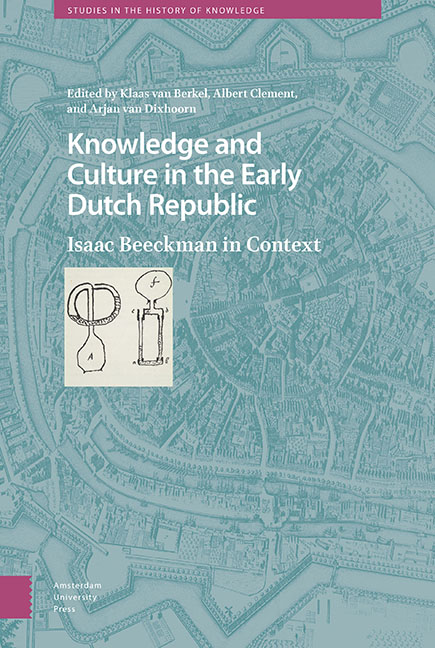13 - Consten-Culture: Beeckman, the Rhetoricians, and a New Style of Philosophizing
Published online by Cambridge University Press: 07 October 2022
Summary
Abstract
This chapter argues that Isaac Beeckman's early Loci communes reveal two major fields of philosophical action. The most well-known is the academic world of learning shown in his life as a teacher and in his network of correspondents (such as Descartes and Mersenne). Less well-known is the other world, which, inspired by Edgar Zilsel's thesis on the role of ‘superior artisans’ in the making of the mechanical science, has often but mistakenly been identified with the world of ‘Beeckman the artisan’. This second philosophical world is the world of consten-culture; a literary world of the Dutch vernacular, in which explicit, bookish, academic, theoretical learning and tacit, bodily, artisanal, practical, experience-oriented knowledge had already been ‘interpenetrating’ for two centuries.
Keywords: Isaac Beeckman, consten-culture, rhetoricians, recipes, philosophical exercises, virtuosi
It is because we supply these living conversational contexts that we understand the directions of philosophic writing. Philosophic writing begins in conversation, and it returns to it. Because the talk that surrounds the writing of philosophy is not mere talk, philosophy is dangerous and subversive. Socrates embraced and wrestled with his friends in talk, not only for love and wisdom but also for the sake of Athens.
– Amelie Oksenberg Rorty, ‘Experiments in Philosophic Genre: Descartes’ “Meditations”’Introduction
Yesterday at the chamber of rhetoric of the Vreuchdendal [Valley of Joy] in Breda, I heard someone say that a ship in Harlem's Lake [Haerlemmermeer] will sink deeper than in other waters that are less silty. I will try and come up with the reason, to establish if this is true.
Sometime in the winter of 1618-1619, the 30-year-old philosopher Isaac Beeckman, who was staying in Breda to help an uncle and court a young woman, turned this topic of conversation into a ‘problem’ of natural philosophy by logging it in his Loci communes and reflecting upon its causes. This notebook, which according to humanist pedagogical practice he had been keeping since the age of sixteen, had by then developed from a compilation of reading notes (commonplaces) into a set of comments on problems that he encountered while reading, engaging in conversations or in observations of all sorts. Regularly, when he theorized about causes, the note taking became fully-fledged philosophizing in the sense of developing a philosophical theory on causes of natural phenomena.
- Type
- Chapter
- Information
- Knowledge and Culture in the Early Dutch RepublicIsaac Beeckman in Context, pp. 339 - 368Publisher: Amsterdam University PressPrint publication year: 2022

